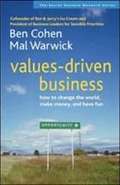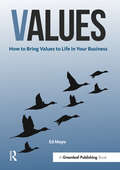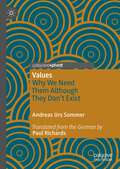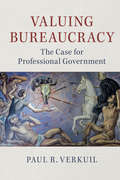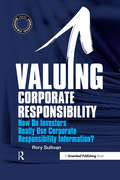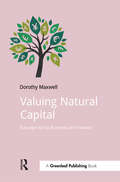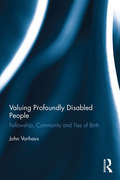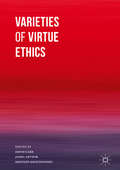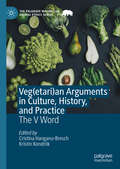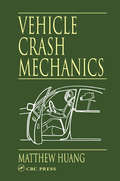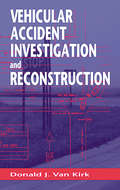- Table View
- List View
Values-Driven Business: How to Change the World, Make Money, and Have Fun
by Ben Cohen Mal WarwickThere's no shortage of books on how to run small businesses, but few of them cover the special value -- and special challenges -- of socially responsible business practices for small- or medium-size companies.
Values: How to Bring Values to Life in Your Business
by Ed MayoWhat matters to us? One way of answering that question is through the lens of values, which have a powerful influence on our attitudes and behaviours. Yet it can be difficult for businesses to realize the true potential of values, which is to engage staff, customers and suppliers in an emotional way that touches on their own core motivations. Drawing on a range of case studies worldwide, including “profit with purpose” businesses such as co-operatives, this short guide reveals how to make a success of values. By unpacking what we mean by values and ethics, and setting out a series of practical approaches, Ed Mayo presents how values can become a natural part of commercial life. This book identifies both the pitfalls and the potential of bringing values into the heart of an organization, from a bank that responds to an ethical crisis to a fast-growing worker co-operative founded on the values of equality. The values that guide your business are not necessarily the ones that are written down, or that you would expect. There is no one right or wrong set of values, but there is power and potential in making the most of the values that are right for the business you are in. By reading Values: How to Bring Values to Life in Your Business, you will find out more about the business that you are, and the business that you could be.
Values: Why We Need Them Although They Don’t Exist
by Andreas Urs SommerIn his book, Andreas Urs Sommer reflects on the question of what it really means when everybody’s appealing to values, all the time – the question, fundamentally, of what values actually are. Values explores both of these points, arriving at two intriguing suggestions: Maybe what we call values are just a set of elaborate fictions. And maybe those fictions serve some very important purposes.
Valuing Bureaucracy: The Case for Professional Government
by Paul R. VerkuilTo be effective, government must be run by professional managers. When decisions that should be taken by government officials are delegated to private contractors without adequate oversight, the public interest is jeopardized. Verkuil uses his inside perspectives on government performance and accountability to examine the tendencies at both the federal and state levels to 'deprofessionalize' government. Viewing the turn to contractors and private sector solutions in ideological and functional terms, he acknowledges that the problem cannot be solved without meaningful civil service reforms that make it easier to hire, incent and, where necessary, fire career employees and officials. The indispensable goal is to revitalize bureaucracy so it can continue to competently deliver essential services. By highlighting the leadership that already exists in the career ranks, Verkuil senses a willingness, or even eagerness, to make government, like America, great again.
Valuing Corporate Responsibility: How Do Investors Really Use Corporate Responsibility Information? (The Responsible Investment Series)
by Rory SullivanInvestors have taken a long time to pay attention to corporate responsibility. Despite the growing number of companies that were taking action to manage the social and environmental impacts of their activities and operations and that were reporting on their corporate responsibility performance, mainstream investors' interest in governance issues was, on the whole, piqued only in those situations where a major accident or scandal hit the headlines. This has changed dramatically. With over 600 large investment institutions, including asset managers, insurance companies and pension funds having signed the UN-backed Principles for Responsible Investment, it can now be plausibly argued that "responsible investment" has become mainstream. This change is potentially of huge significance, and the investment community is now widely seen as one of the key audiences for the thousands of corporate responsibility reports produced each year. Yet the reality is that there is a striking lack of understanding among companies of investors' interests. The consequence has been that, despite many companies identifying investors as one of the critical audiences for their corporate responsibility reports, most investors – even those that have made commitments to responsible investment – see these reports as irrelevant to their investment decision-making. The problem is compounded by the singularly poor job that investors do of explaining to companies what sort of information they are really interested in, and where corporate responsibility performance fits into their overall assessments of companies. This has led to frustrations on both sides. Investors have been accused of not paying sufficient attention to companies' corporate responsibility performance, and companies have been accused of producing information that not only has no immediate relevance to investors but, worse, seems to have no relevance to the key business challenges that these companies face. Valuing Corporate Responsibility aims to address the "dialogue of the deaf" that characterizes too many of the discussions between companies and their investors on corporate responsibility issues, through: 1. Explaining to companies what responsible investment looks like in practice and, from this analysis, explaining what sort of corporate responsibility information investors are interested in and how this information is used in practice. 2. Explaining to investors some of the practical difficulties faced by companies when preparing corporate responsibility reports and the implications for the quality and utility of the data provided in these reports. Valuing Corporate Responsibility also analyses how issues such as investors' views on materiality and investment time-frames influence the dialogue that investors have with companies on corporate responsibility matters. It concludes that there is a need for a major rethink of current approaches to responsible investment, as the manner in which most investors are implementing their responsible investment commitments is unlikely to see them making a substantial contribution to improving corporate responsibility performance or to the wider goals of sustainable development. Written by one of the world's leading experts on responsible investment, Valuing Corporate Responsibility is one of the most important books to be written on corporate responsibility over the past decade. It is of relevance not only to companies and to responsible investment professionals but to all those interested in really understanding how companies and their investors relate to each other and the implications of this relationship for sustainable development.
Valuing Natural Capital: Future Proofing Business and Finance (Doshorts Ser.)
by Dorothy MaxwellCompanies that will succeed in the long-term are integrating natural and social capital into their business model now. Natural capital, the resources and critical support services nature provides, underpins our entire global economy. Yet despite its vast social and economic value, the many benefits of natural capital are often assumed to be "free". The future shock for business is the potential for profit to be wiped out as natural capital is internalized through regulation and markets. Freshwater, forests and biodiversity are being consumed at an alarming rate, and critical support systems such as the ability to regulate climate are failing. As these and other sustainability challenges develop, businesses and their investors need to understand their role in maintaining natural capital and their natural capital risks and opportunities. The language of finance provides a useful approach for communicating trade-offs and prioritizing sustainability at CFO, CEO and board level: companies who "future-proof" now will position themselves to thrive in a resource-constrained world. They will mitigate risk, secure their resource supplies, create long-term value and enhance their resilience, reputation and competitive advantage. This book provides a succinct introduction to natural capital: what natural capital is and how it links to other capitals; the business case for using it in decision-making; where natural capital accounting and valuation fit in the sustainability and financial toolbox; and what real life early adopters of natural capital in business are doing. Views from natural capital leaders across business, finance, accounting, government, research and NGO communities illustrate the theory with practice. Included: Quotes and case examples from CFOs, CEOs and Heads of Sustainability in early adopter businesses (Kingfisher Group, Dow Chemical Company, The Crown Estate, Patagonia®, United Utilities and Marks & Spencer) and financial institutions (Inter-American Development Bank, Citi Group and Credit Suisse).
Valuing Profoundly Disabled People: Fellowship, Community and Ties of Birth (Routledge Research in Special Educational Needs)
by John VorhausGrowing numbers of human beings live with profound and multiple learning difficulties and disabilities. Exploring the moral, social and political implications of this trend, Valuing Profoundly Disabled People addresses questions that are high on policy and practice agendas in numerous regions around the world, including the UK and the EU, the USA, and Australasia. In this important work Vorhaus examines fundamental moral and social questions about profound disability, and each chapter combines a comprehensive review of existing literature with thought-provoking and original philosophical arguments. Vorhaus argues that there is a pressing need to consider the moral and political claims of people whose lives are characterised by extensive impairments, dependency and vulnerability. The book prompts readers to reflect on complex issues relating to the practices of caring, teaching and treating people with profound disabilities in contexts such as education, health care and social policy. Providing a much-needed contribution to the field, this book will be of interest to postgraduates, academics and researchers in a number of distinct and interrelated fields, including disability and impairment, human rights, philosophy, sociology, health and social policy, and education. The book will also be of great interest to practitioners and policymakers seeking to promote the aims of realising human potential and respecting disability.
Vanessa: A Portrait of Evil
by Wensley ClarksonThe compelling and disturbing true story of Vanessa George and the evil abuse she doled out upon the children of more than 300 families.As a nursery worker, wife and mother, she was a figure to place trust in. Yet her adulterous relationship and sick love triangle with Colin Blanchard and Angela Allen drew her into a dark world of violence and sexual abuse. To compete for Blanchard's attention she would do everything in her power to impress him, even if this meant committing unspeakable acts of sexual violence on children as young as two years old.What could have driven a mother to betray not only her daughters and loving husband, but the very families who entrusted her with their children? How could a seemingly caring women become engaged in a sordid and vile love triangle with a man and woman she had never met? Were there events in her own childhood that pushed her to commit these acts?True crime expert Wensley Clarkson pieces together the events surrounding the case as well as new investigative research to compile a fascinating yet disturbing account of a case which shocked a nation.We may never know the full extent of Vanessa George's cruelty, but the horror of her story will remain as a chilling memory for generations.
Vanish
by Tom PawlikThree strangers each encounter a mysterious storm and awake the next day to find that everyone else has vanished. When their paths cross, they discover they are being forced to relive vivid hallucinations of events from their past.
Vanishing Borders of Urban Local Finance: Global Developments with Illustrations from Indian Federation
by Shyam Nath Yeti Nisha MadhooThis book examines the emerging trends in vanishing borders of urban local government finance due to uncertain local tax and expenditure regimes. It analyzes the global developments with illustrations from state budgetary operations of the Indian federation. This trend has gained momentum due to concentration of population in cities and big towns as a consequence of globalization, leading to enhanced environmental vulnerability due to climate change. Expanding expenditure needs have not been corresponded by revenue regimes and transfers. Moreover, involving corporate sector in local area preference initiatives through mandatory corporate social responsibility (CSR) is an interesting development. It is expected to work as a local fiscal additionality to supplement locally provided civic and infrastructure services. This additionality may also evolve into public private partnerships at the local level. Such development however has the potential of displacing local government operations. The focus of the book hinges around critically examining setbacks to fiscal decentralization and challenges in improving the status of urban local finances to enhance fiscal autonomy of these governments, particularly in Indian scenario. The book also explores the possibility of an expanded role of local fiscal policy in the context of globalization and climate change, besides addressing the conventional responsibilities with respect to quality of civic services.
Vanishing Contract Law: Common Law in the Age of Contracts (Law in Context)
by Catherine MitchellEnglish contract law provides the invisible framework that underpins and enables much contracting activity in society, yet the role of the law in policing many of our contracts now approaches vanishing point. The methods by which contracts come into existence, and notionally create binding obligations, have transformed over the past forty years. Consumers now enter into contracts through remote and automated processes on standard terms over which they have little control. This book explores the substantive weakening of the institution of contract law in a society heavily dependent on contracts. It considers significant areas of contracting activity that affect many people, but that escape serious and sustained legal scrutiny. An accessibly written and succinct account of contract law's past, present and future, it assesses the implications of a diminished contract law, and the possibilities, if any, for its revival.
Vanishing Legal Justice: The Changing Role of Judges in an Era of Settlements and Plea Bargains
by Michal Alberstein Nofit AmirA full trial has become an uncommon phenomenon in many legal systems, replaced largely by promotion of settlement and plea-bargaining. This book uncovers today's judicial role in this radically changed legal setting using multiple methods. Over five years, researchers analyzed court dockets, studied judges in action, and conducted interviews with judges and lawyers. This book, which spans several legal cultures, follows in the footsteps of the 'vanishing trial phenomenon', probing its existence beyond common law systems. In doing so, it provides insights into the changing judicial role and the metamorphosis of legal systems. Offering a new perspective on possible futures of legal systems, including the use of artificial intelligence, the authors provide a rich context for legal scholars and policymakers to redesign the architecture of conflicts. Moreover, they introduce new jurisprudential perspectives on the relationship between law and conflict resolution, with an emphasis on the judicial role.
Vanity: 21st Century Selves
by Suzanne Fraser Claire Tanner Janemaree MaherWhat role does 'vanity' play in the lives of 21st century subjects? Exploring a range of fields including public health, information technology, media studies and feminist approaches to the body and beauty, this book offers a broad analysis of how 'vanity' shapes contemporary Western societies and its understandings of selfhood.
Varieties of European Economic Law and Regulation
by Kai Purnhagen Peter RottThis is the first book to comprehensively analyze the work of Hans Micklitz, one of the leading scholars in the field of EU economic law. It brings together analysts, academic friends and critics of Hans Micklitz and results in a unique collection of essays that evaluate his work on European Economic Law and Regulation. The contributions discuss a wide range of Micklitz' work: from his theoretical work on private law beyond party autonomy, with a special focus on its regulatory function, to the illustration of how his work has built the basis for current solutions such as used in solving the financial crisis. The book is divided into sections covering foundations of private law, regulatory law, competition and intellectual property law, product safety law, consumer contract law and the enforcement of law. This book clearly shows the enormous impact of Hans Micklitz' work on the EU legal system in both scholarship and practice.
Varieties of Virtue Ethics
by David Carr Kristján Kristjánsson James ArthurThis book explores recent developments in ethics of virtue. While acknowledging the Aristotelian roots of modern virtue ethics - with its emphasis on the moral importance of character - this collection recognizes that more recent accounts of virtue have been shaped by many other influences, such as Aquinas, Hume, Nietzsche, Hegel and Marx, Confucius and Lao-tzu. The authors also examine the bearing of virtue ethics on other disciplines such as psychology, sociology and theology, as well as attending to some wider public, professional and educational implications of the ethics of virtue. This pioneering book will be invaluable to researchers and students concerned with the many contemporary varieties and applications of virtue ethics.
Vatican I: The Council and the Making of the Ultramontane Church
by John W. O'MalleyThe enduring influence of the Catholic Church has many sources—its spiritual and intellectual appeal, missionary achievements, wealth, diplomatic effectiveness, and stable hierarchy. But in the first half of the nineteenth century, the foundations upon which the church had rested for centuries were shaken. In the eyes of many thoughtful people, liberalism in the guise of liberty, equality, and fraternity was the quintessence of the evils that shook those foundations. At the Vatican Council of 1869–1870, the church made a dramatic effort to set things right by defining the doctrine of papal infallibility. In Vatican I: The Council and the Making of the Ultramontane Church, John W. O’Malley draws us into the bitter controversies over papal infallibility that at one point seemed destined to rend the church in two. Archbishop Henry Manning was the principal driving force for the definition, and Lord Acton was his brilliant counterpart on the other side. But they shrink in significance alongside Pope Pius IX, whose zeal for the definition was so notable that it raised questions about the very legitimacy of the council. Entering the fray were politicians such as Gladstone and Bismarck. The growing tension in the council played out within the larger drama of the seizure of the Papal States by Italian forces and its seemingly inevitable consequence, the conquest of Rome itself. Largely as a result of the council and its aftermath, the Catholic Church became more pope-centered than ever before. In the terminology of the period, it became ultramontane.
Veg: The V Word (The Palgrave Macmillan Animal Ethics Series)
by Cristina Hanganu-Bresch Kristin KondrlikThis collection explores the arguments related to veg(etari)anism as they play out in the public sphere and across media, historical eras, and geographical areas. As vegan and vegetarian practices have gradually become part of mainstream culture, stemming from multiple shifts in the socio-political, cultural, and economic landscape, discursive attempts to both legitimize and delegitimize them have amplified. With 12 original chapters, this collection analyses a diverse array of these legitimating strategies, addressing the practice of veg(etari)anism through analytical methods used in rhetorical criticism and adjacent fields. Part I focuses on specific geo-cultural contexts, from early 20th century Italy, Serbia and Israel, to Islam and foundational Yoga Sutras. In Part II, the authors explore embodied experiences and legitimation strategies, in particular the political identities and ontological consequences coming from consumption of, or abstention from, meat. Part III looks at the motives, purposes and implication of veg(etari)anism as a transformative practice, from ego to eco, that should revolutionise our value hierarchies, and by extension, our futures. Offering a unique focus on the arguments at the core of the veg(etari)an debate, this collection provides an invaluable resource to scholars across a multitude of disciplines.
Vehicle Crash Mechanics
by Matthew HuangGoverned by strict regulations and the intricate balance of complex interactions among variables, the application of mechanics to vehicle crashworthiness is not a simple task. It demands a solid understanding of the fundamentals, careful analysis, and practical knowledge of the tools and techniques of that analysis.Vehicle Crash Mechanics s
Vehicular Accident Investigation and Reconstruction
by Donald J Van KirkAccident investigation/reconstruction is more than just a job or even a profession; it is more art than science and requires a dedication greater than a commitment of time. It takes constant reading, study, and analysis of accident information and case reconstructions to keep improving your performance, both in the field and in the courtroom.
Venezuela – Dimensions of the Crisis: A Perspective on Democratic Backsliding (Contributions to Political Science)
by Wolfgang Muno Miguel Angel Latouche Alexandra GerickeThe book is devoted to the subject of Venezuela's politics and the different dimensions of its longstanding crisis, with various researchers exchanging ideas on the current problems affecting the country. It is the first comprehensive overview on the dimensions of Venezuela’s current crisis written in English, thus filling an important research gap. Especially the participation of international, well-known scholars make it a global enterprise. The book covers historical and theoretical facts surrounding the case of Venezuela and also focuses on the parties and actors that play decisive roles in the conflict. Subjects include the military, public administration, ideology, the opposition, the party landscape along with its crisis and Venezuela's oil policy. Furthermore the book touches upon international and regional aspects: Venezuela's diplomatic relations with the EU, the USA, Cuba and Colombia, respectively. The volume addresses a wider audience, such as scholars on Latin American and especially Venezuelan Politics, International Relations, as well as an interested public, including journalists and politicians.
Venture Capital Law in China (International Corporate Law and Financial Market Regulation)
by Lin LinChina's venture capital market is not just the world's largest and fastest developing market, it also has the unique distinction of being engineered through heavy governmental intervention. This book breaks new ground by examining and testing established legal theories regarding the law of venture capital through the lens of the Chinese venture capital market. Using a hand-collected dataset of venture capital agreements, interviews with practitioners, and Chinese court judgements, it provides a comprehensive and insightful analysis of the Chinese venture capital market from the legal perspective. Topics covered include the roles of law and governmental intervention in developing the market, the state of investor protection, unique contractual developments and exits of venture capital investments. By providing an in-depth comparative analysis against the American venture capital market, it provides critical context and makes the Chinese venture market accessible. It is an invaluable resource for venture capital scholars, policymakers and practitioners.
Verantwortungsvolle Digitalität: Warum wir den digitalen Wandel gestalten sollten
by Christoph BöhmDigitale Produkte, Dienste sowie Kommunikationsformen zeichnen sich besonders dadurch aus, dass sie im physikalischen Sinne immateriell sind. Aus dieser Eigenschaft folgen vielfältige Möglichkeiten, Lebenspraktiken und Lebenswelten individuell zu gestalten. Leicht zu verbreitende Digitalprodukte vermitteln gesteigerte Wirksamkeitserfahrung, welche den Digitalen Wandel wirtschaftlich, technisch und gesellschaftlich in Gang hält. Wachstumsgrenzen scheinen durch disruptive Innovationen der Künstlichen Intelligenz, der digitalen Vernetzung sowie auch der Virtualisierung von Lebenswelten zu diffundieren. Ein systemischer Blick auf die Veränderungsdynamiken führt zur Einsicht, dass Anerkennungswettläufe zur Sicherung der sozialen Position entbrennen. Um einer Abwärtsspirale zu entfliehen, fühlen sich Individuen sowie wirtschaftliche Akteure genötigt, Verwirklichungschancen der Digitaltechnologie ergreifen zu müssen, da ansonsten die Todeserfahrung einer sozialen oder wirtschaftlichen Irrelevanz droht. Diesem Krisenphänomen setzt das Buch eine Idee entgegen, wie aus selbstfürsorglicher Integrität heraus eine lebensdienliche und vor allem gerechte Digitalität verwirklicht werden könnte.
Verantwortungsvolle Unternehmensführung: Corporate Governance, Compliance Management und Corporate Social Responsibility
by Claudia KreiplIn diesem Lehrbuch beschreibt Claudia Kreipl in kompakter Form unternehmerische Verantwortung als Zusammenspiel ökonomischer, rechtlicher und ethischer Verantwortung. Basierend auf einer systematischen Betrachtung der verschiedenen Ebenen sowie der Zielgruppen verantwortungsvollen Handelns entwickelt sie einen ganzheitlichen Ansatz. Analysiert werden alle drei Handlungsfelder – Corporate Governance, Compliance Management und Corporate Social Responsibility – hinsichtlich ihrer Hintergründe und Facetten sowie ihrer Bedeutung für die unternehmerische Praxis. Daraus entwickelt die Autorin ein Gesamtkonzept, das den Unternehmenserfolg nachhaltig sichert.
Verbraucherforschung zwischen Empowerment und Verletzlichkeit: Verbraucherrelevante Zukunftsfragen aus der Perspektive der Wissenschaft und Praxis
by Gunnar Mau Michael Schuhen Manuel FroitzheimAR, KI, Digitale Sprachassistenten… die zunehmende Digitalisierung des Alltags und der Wandel unserer Lebensbedingungen stellt Verbraucher*innen vor neue Herausforderungen: Während die Möglichkeiten zur Information und Einflussnahme durch uns steigen, geben wir gleichzeitig immer mehr Entscheidungsgewalt an (smarte) Dritte ab. Werden wir als Verbraucher*innen also mächtiger – oder doch verletzlicher? Forschende unterschiedlicher Disziplinen haben sich dieser Frage angenommen und präsentieren in diesem Buch ihre Erkenntnisse zu verbraucherrelevanten Zukunftsfragen. Flankiert werden diese Erkenntnisse durch Beiträge von Praktiker*innen, die die wissenschaftlichen Erkenntnisse aus Anwendungsperspektive einordnen.
Verbraucherinformatik: Grundlagen und Anwendungsfelder der digitalen Konsumgesellschaft
by Dirk Schreiber Alexander Boden Paul Bossauer Gunnar Stevens Lena ReckiIn einer Zeit, in der digitale Technologien nahezu jeden Aspekt unseres Lebens durchdringen, ist es unerlässlich, die tieferen Zusammenhänge des digitalen Konsums zu verstehen. Erstmalig bietet dieses open access-Lehrbuch einen Wegweiser durch die vielfältigen Facetten der Digitalisierung des Konsums. Dabei verbindet es die Disziplinen der angewandten Informatik und Verbraucherwissenschaften. Die Leserinnen und Leser erhalten Einblick in die digitale Konsumlandschaft, ausgehend von der historischen Entwicklung des (digitalen) Konsums. Dazu vermittelt das Lehrbuch zentrale Grundbegriffe und Themen der Verbraucherinformatik und stellt verschiedene Konsumtheorien aus den Disziplinen Wirtschaftswissenschaften, Psychologie und Sozialwissenschaften vor. Praxisnahe Beispiele aus der Digitalisierung bieten Einsichten in unterschiedliche Perspektiven, während vertiefende Textboxen und Selbstreflexionsfragen das Verständnis fördern. Inhaltlich decken die Autorinnen und Autoren Themen von Datenschutz bis zur Sharing Economy ab und geben insbesondere auch praktische Ansätze für Themen wie Verbraucherschutz und Nachhaltigkeit mit auf den Weg. Die Anwendungs- und Querschnittsthemen der Verbraucherinformatik reichen von der Digitalisierung der Haushalte und Märkte über Fragen des digitalen Verbraucherschutzes bis hin zu zentralen gesellschaftlichen Fragestellungen rund um die Themen Fairness, Verantwortung und Nachhaltigkeit bei der Gestaltung von digitalen Technologien. Das Buch bietet einen umfassenden Überblick, der sowohl für Studierende der Wirtschafts- und Sozialwissenschaften als auch der angewandten Informatik von bedeutendem Wert ist.
